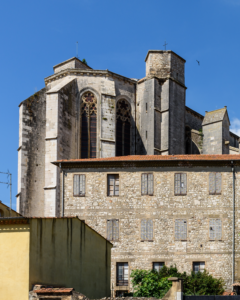About the City
Saint-Maximin-la-Sainte-Baume, located in the Var department of southern France, combines Provençal charm with historical significance. Surrounded by vineyards and hills, the town is best known for its proximity to the Sainte-Baume mountain and forest, a place of legend and pilgrimage. With its lively markets, local craftsmanship, and welcoming community, Saint-Maximin offers an authentic glimpse into Provence’s cultural and natural heritage.
Main Objectives
This pilot in Saint-Maximin-la-Sainte-Baume focuses on:
- Decarbonizing last-mile delivery for food logistics.
- Enabling delivery using sustainable technologies.
- Promoting short food supply chains between producers and consumers.
Innovative Technical Solution
The pilot project involves converting a diesel van into an electric vehicle and installing an electric charging station at Campus Provence Verte, a recognised agricultural education institution. This approach reduces emissions and ecological footprints while reusing existing vehicles.
Key benefits of retrofitting include:
- Cost efficiency : Removing a diesel vehicle from the road reduces emissions from its use and avoids those from manufacturing a new vehicle.
- Environmental Impact : Reduced waste and emissions by extending vehicle lifespan.
- Regulatory Compliance : Alignment with European decarbonization and air quality regulations
Key Stakeholders
- Campus Provence Verte : a renowned agricultural education institution, trains nearly 730 students from secondary to post-secondary levels in the fields of agriculture, food, environment, and rural services. Located on a 15-hectare estate, this learning and living environment promotes innovation, sustainability, and youth success at the heart of the Provençal region.
- Local Public Authorities: Supporting sustainable urban mobility initiatives
Implementation Strategy
- Retrofitting Process : Convert a diesel vehicle into an electric vehicle.
- Infrastructure Development : Install an electric charging station next to a new building that will house the campus’s new central cafeteria.
- Collaborative Approach : Engage stakeholders in developing efficient and sustainable logistics solutions for the region.
Expected Impact
- Environmental : Significant reduction in greenhouse gas emissions and air pollution.
- Economic : Cost-effective logistics solutions for food transport.
- Social : Increased awareness and adoption of sustainable practices in urban logistics.
By integrating innovative retrofitting technology and sustainable logistics, Saint-Maximin-la-Sainte-Baume’s pilot exemplifies an eco-friendly approach to urban food transport while supporting local producers and communities.

